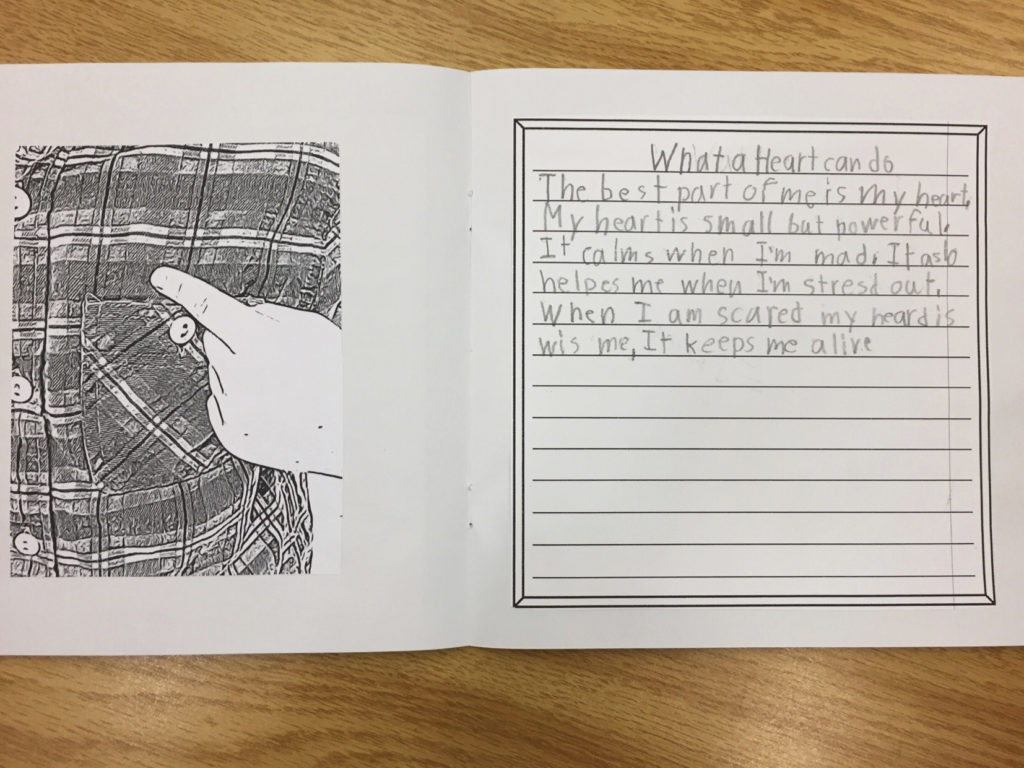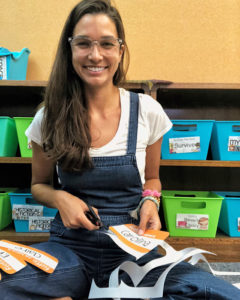In this new introduction to her 2019 post, NCTE member Ashlan Bishop reflects on how she further adapted and varied her poetry approach.
When I first implemented this project, I was a student-teacher in a second grade classroom at the start of my journey into education. Five years later, my passion for literacy instruction has grown along with an awareness of just how much teachers juggle in classrooms every day. While I have seen that there are often challenges to implementing a full poetry writing unit like this one, I have found value in my own practice in using parts of the unit to support my students at various points in the year.
I am now teaching first grade, and we use poetry reading as a staple in our morning meeting routine to explore emotions, interests, and history. We are just beginning poetry writing instruction modeled on the unit described below but will fit it in over a longer period and in various blocks, including some small group time, some whole group writing workshops, etc. I also hope to adapt some spoken word components, especially for my beginning writers. In the socio-emotional sphere, writing has become a key element in my toolbox for supporting kids experiencing big emotions, too.
This poetry month, I challenge you to add to your instruction at least one new poetry component that feels feasible in your classroom context. Whether it’s creating books of poetry with your students or sharing the joy of one short poem a day, I have seen firsthand how even small moments with this genre can create valuable engagement and learning.
Short.
Dumb.
Silly.
These were the words my second-grade students used to describe themselves during a session practicing adjectives. Either my students didn’t see themselves the way I did or they didn’t feel comfortable naming their strengths. This particular group had the academic skills to meet the learning goal, however, when I pressed them to move past this language of deficit, they were unwilling to cross that line. My students could or would not state a single positive adjective to describe themselves other than “fun.”
What could I do about this? I knew I wanted to weave some positive self-reflection into upcoming writing. I only had a few months left to affect their self-identity in any positive way, and I felt the lowest-hanging fruit was to at least facilitate some practice speaking and writing about themselves with more asset-focused language. If the way we speak can really influence our self-confidence then I wanted to be sure they had beneficial practice.
It was February and we were approaching a unit on poetry, so I created a project where students wrote six poems centered on their own positive attributes. My second-graders used blank books with paper templates glued in to publish their words and pictures, but this project could be easily adapted to higher grades using technology.
Here’s how we got past our hesitation—I hope these tips help you too, if you would like to try a similar project:
Model, model, model
I first wrote an example for each type of poem about myself. Breaking the ice with my own bold, positive self-talk really paved the way for greater comfort for students. I also provided student models I pulled from the internet or coaxed some of my coworkers’ kids into writing!
Chose a variety of poetry forms.
We wrote poems in six forms, including acrostics, I AM poems, cinquains, simile poems, and free verse poetry. You could change up the specific forms to fit your classroom needs, but I would suggest including at least one free verse or more open-form type. We took inspiration for our free verse poems from The Best Part of Me: Children Talk About their Bodies in Pictures and Words by Wendy Ewald.
Start with the most simple or structured poems and build up.
Consider what your students are able to do and meet them there. My students had very little experience with poetry writing other than acrostics, so that served as our entry point. As we went along, the form got more involved and/or required more production from students. Because of the age of my students, I also included templates to assist them as they wrote their first drafts.
Similarly, consider starting each workshop with a graphic organizer.
I gave students a graphic organizer at the start of every poetry workshop in which to brainstorm for each new poem. This structure seemed to aid in their creativity and let them focus on overcoming the hesitation to self-reflect rather than the intimidation of a blank page. Consider what scaffolds your students may need.
Define your purpose and audience.
My students created their books for presentation to their loved ones during an open house night.
Because students had this audience in mind, it seemed to give additional purpose to their reflection and made the effort feel more natural. I never required them to share with peers, though I encouraged it.
Will your students keep their books for themselves? Will they publish their work in some way? I felt that preparing them ahead of time for who would see these books gave them a valuable level of comfort.

We all agree that our students face great pressure today, and many struggle with confidence and coping tools.
As teachers we hope to ensure we are supporting their mental health and fostering comfort in exploring self-identity in our classrooms. Integrating academic standards with socio-emotional goals can help ensure we give students opportunities to flourish academically and personally. Poetry is fertile ground for the important skill of self-reflection to reach both of these ends.
As for my students’ experience? Though of course not every student connected with the project, I felt it at least laid a foundation for future positive reflection when they left my classroom. In many students, hesitation did wonderfully transform into greater confidence and pride. I’ll let some of their own words speak to their growth:
[I] shine out stars.
My heart is small but powerful.
I am rare and helpful.

Ashlan Bishop is a teacher in Jacksonville, Florida with an Master of Education from the University of Florida. She will be pursuing a PhD in the fall studying equitable elementary literacy instruction. She can be reached at ashlanbishop@gmail.com.
It is the policy of NCTE in all publications, including the Literacy & NCTE blog, to provide a forum for the open discussion of ideas concerning the content and the teaching of English and the language arts. Publicity accorded to any particular point of view does not imply endorsement by the Executive Committee, the Board of Directors, the staff, or the membership at large, except in announcements of policy, where such endorsement is clearly specified.

